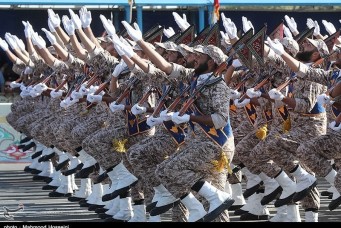Is a Nuclearized Middle East Inevitable?
How to address the challenge of nuclear proliferation in the Middle East.
The recent statement by Saudi Crown Prince Mohammed Bin Salman that his country would acquire nuclear weapons if Iran had them has understandably raised serious concern, albeit for the wrong reasons. The statement raised red flags because the crown prince openly said that Saudi Arabia would enhance its military capacity to counterbalance those of its neighbors, particularly Iran.
The Middle East is in a state of turmoil from North Africa through the Levant and southwards to the Arabian Gulf. A natural consequence of ongoing conflicts is militarization, be that at the level of conventional armaments or weapons of mass destruction. Arms expenditures—whether by acquisition from abroad, or as part of domestic industrial production—are at an historic high.
The Saudi crown prince was actually only projecting policies that neighbors, as well as the major powers globally, have pursued since the beginning of the Cold War. In fact, both Israel and Iran have greatly enhanced their domestic military industrial capacity, including nuclear technology. Israel is reported to have over 200 nuclear warheads, and has not signed the Treaty on the Non-Proliferation of Nuclear Weapons (NPT). Both countries have acquired sophisticated delivery systems.
Despite Iran being a full member of the NPT, concerns emerged over whether its civilian nuclear program could serve as a cover for the development of a military nuclear capability. The Joint Comprehensive Plan of Action (JCPOA) between Iran and the P5+1 was meant to address these concerns, but seems to have fallen short because of worries over the relatively short “breakout time” for Iran to achieve a military nuclear capability once the restrictions imposed by the agreement expire. There are also concerns regarding Iran’s ballistic missile capacity, which is not part of the agreement. And of course, Iran’s aggressive policies and hegemonic regional ambitions only add to the prevailing concerns over its nuclear program.
The real concern should be that the Saudi crown prince’s statement could be read as a warning that a nuclearized Middle East is no longer a distant prospect. If left unchecked, these developments will severely destabilize an already turbulent regional security situation. Ignoring the threat of nuclear proliferation in the Middle East is simply no longer tenable.
Time is of the essence. Middle Eastern states will seek to augment their military capabilities, and enhance their domestic military capacities if these concerns are not met. This will include amassing more weapons, at a higher level of sophistication. Acquiring more weapons capacity in the nuclear domain will be one of the options.
A preferable alternative would be to forthrightly address the emerging nuclear threats in the region by rectifying the asymmetries in nonproliferation commitments, and encouraging regional adherence to the various treaty frameworks that make up the global nonproliferation regime with regards to nuclear, chemical, and biological weapons, as well as their means of delivery.
Rather than abrogating the P5 + 1 nuclear deal with Iran, a better approach would be to augment it with a comprehensive region-wide approach to the proliferation challenge in the Middle East. Egypt has long called for the establishment of a zone free of weapons of mass destruction in the Middle East. All states in the region—including both Israel and Iran have—expressed support for the establishment of such a zone. Egypt itself has already made its adherence to international agreements that prohibit chemical and biological weapons contingent upon Israel joining the NPT.
The concerns about breakout time in JCPOA enters into play after approximately fifteen years. In moving forward, the best option would be to create a negotiating, working group from Middle Eastern states, under the auspices of the permanent members of the UN Security Council, with the participation of the International Atomic Energy Organization, the Organisation for the Prohibition of Chemical Weapons, and the Comprehensive Nuclear-Test-Ban Treaty Organization as the relevant technical bodies of the major nonproliferation treaty regimes. This format would accommodate Israel’s and the United States’s preference for regional negotiations.
At the same time, through the participation of the P5, there is a wider international cover that addresses Iranian and Arab concerns.
The task of the working group would be to negotiate an agreement to create a Middle East Weapons of Mass Destruction Free Zone (MEWMDFZ) and have it enter into force before the provisions enshrined in the JCPOA expire. Arrangements would also be made to expand the scope of the original proposal to include measures to contain the means of delivery of these weapons.
As a preliminary indication of seriousness, the negotiating parties would be asked to deposit letters with the UN Security Council committing themselves to this objective and to abstain from further developing their weapons of mass destruction capacities while negotiations are ongoing.
Such a zone can be achieved under a single wide-ranging regional framework that addresses all weapons of mass destruction in the region, as well as complementary regional verification arrangements to ensure compliance. It can, however, also be also be achieved initially through universal adherence to existing international agreements prohibiting these weapons coupled with, if necessary, additional verification measures. The optimum approach would be a hybrid of both.
Each of the three international technical agencies should be invited to suggest confidence-building measures in their areas of expertise to create a better environment for negotiations. They can also be called upon to assist in developing verification measures commensurate with such agreements. And, the P5 could constructively suggest a series of other measures regarding good neighborly relations to decrease bilateral tensions in the region.
The international community, with the Middle East at its core, can either engage in bold, although difficult negotiations, or face the inevitable dangerous ramifications of further weaponization and nuclearization of the Middle East.
Nabil Fahmy, a former foreign minister of Egypt, is the dean of the School of Global Affairs and Public Policy at the American University in Cairo. He served as Egypt’s ambassador to the United States from 1999–2008, and as envoy to Japan between 1997 and 1999. On Twitter: @DeanNabilFahmy.




